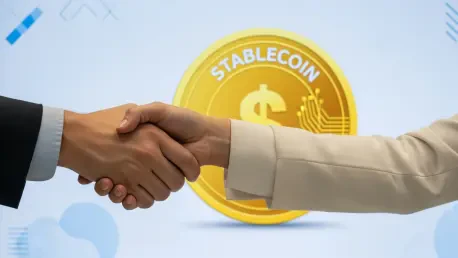What happens when the sluggish pace of traditional transactions meets the lightning speed of digital innovation? In today’s financial landscape, where cross-border payments can still take days and cost a fortune, a groundbreaking partnership is emerging to challenge the status quo. Worldline, a global titan in payment services, and Fipto, a European fintech powerhouse in stablecoin technology, have joined forces to transform how money moves across Europe. This collaboration promises to blend the reliability of established systems with the agility of digital currencies, offering a glimpse into a future where payments are instant, borderless, and accessible around the clock.
Why Stablecoins Are the Game-Changer Europe Needs
Stablecoins, digital currencies tied to stable assets like fiat money, are no longer just a niche concept—they’re becoming a cornerstone of modern finance. With the ability to settle transactions in seconds rather than days, they address a critical pain point in global trade. A recent report from Juniper Research suggests that cross-border payments using blockchain-based solutions like stablecoins could save businesses up to $10 billion annually in fees by 2030. For Europe, where economic integration demands efficiency, this technology offers a lifeline to streamline operations for merchants and banks alike.
Beyond cost savings, stablecoins operate 24/7, unshackled from the limitations of banking hours or weekends. This constant availability could redefine how businesses manage cash flow, especially for small and medium enterprises that often struggle with delayed settlements. The urgency to adopt such tools is clear: without them, Europe risks falling behind in the global race for financial innovation, ceding ground to regions already embracing digital currencies at scale.
Europe’s Digital DilemmSovereignty at Stake
As the world pivots toward digital economies, Europe faces a pressing challenge—maintaining control over its financial infrastructure. Relying on external stablecoin platforms or technologies could undermine technological sovereignty, leaving the region vulnerable to foreign influence over critical systems. The partnership between Worldline and Fipto steps into this gap, aiming to build a homegrown ecosystem that prioritizes security and compliance with European regulations.
This strategic move is not just about keeping pace but about leading the charge. By integrating stablecoins with traditional payment rails, the collaboration ensures that innovation doesn’t come at the expense of stability. Merchants and financial institutions stand to benefit from a system that respects local governance while offering the perks of cutting-edge technology, positioning Europe as a hub of balanced financial progress.
Inside the Worldline-Fipto Alliance
At the heart of this partnership lies a synergy of expertise: Worldline brings its extensive network and deep understanding of payment processing, while Fipto contributes pioneering stablecoin infrastructure. Together, they are crafting solutions that bridge the old and the new. Their focus includes developing real-world applications, with pilot projects already targeting merchants in Europe and the Asia-Pacific region to test faster, cheaper transaction methods.
A key pillar of their work is creating hybrid ecosystems where digital and traditional payments coexist seamlessly. This approach allows businesses to pick and choose based on specific needs—whether it’s speeding up international transfers or enabling programmable payments for automated processes. Such flexibility ensures that the transition to stablecoins isn’t disruptive but rather a tailored enhancement to existing operations.
Leaders Speak: Vision for a New Payment Era
Insights from the minds behind this venture reveal a shared commitment to tangible impact. Thibault Pele, Head of Digital Currencies at Worldline, notes, “Collaboration is key to reshaping payments for the modern age, and working with partners and clients ensures solutions that truly matter.” His words reflect a focus on co-creation, emphasizing that innovation must serve real user demands.
On the other side, Patrick Mollard, Co-Founder & CEO of Fipto, points to the practical outcomes: “This alliance is about boosting efficiency and resilience in payments through applications that work today.” Their combined vision highlights a drive to not only theorize about stablecoins but to embed them into Europe’s financial fabric, backed by the credibility of two industry frontrunners dedicated to results.
Navigating the Stablecoin Shift: A Guide for Businesses
For companies eager to tap into this emerging landscape, the Worldline-Fipto partnership offers a clear path forward. The first step is assessing specific challenges—whether it’s the high cost of cross-border transactions or delays in settlement times—and determining if stablecoins can provide a fix. This targeted evaluation helps avoid unnecessary overhauls while pinpointing areas for improvement.
Starting small is another practical tip: businesses can test stablecoin solutions in low-risk scenarios, such as internal fund transfers, to gauge benefits and iron out compliance issues. Partnering with trusted experts like Worldline and Fipto ensures access to secure integration, while staying aligned with Europe’s regulatory standards remains critical to managing risks. These actionable measures provide a low-barrier entry into a transformative payment model, empowering firms to adapt at their own pace.
Reflecting on a Milestone in Financial Evolution
Looking back, the alliance between Worldline and Fipto marked a turning point in how Europe approached digital payments. Their efforts to merge stablecoin technology with traditional systems laid a foundation for efficiency and innovation that reshaped merchant and banking experiences. It was a bold step that balanced progress with prudence, ensuring accessibility without sacrificing security.
As the financial world continued to evolve, their collaboration stood as a reminder of the power of strategic partnerships. Businesses were encouraged to explore similar integrations, leveraging expert guidance to adopt stablecoin solutions. The path forward involved staying vigilant about regulatory shifts and scaling pilot successes into broader applications, ensuring that the momentum of this pioneering effort carried into lasting change.









